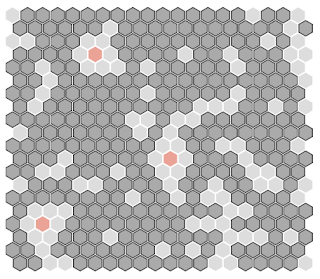Infection Simulation You Can Run Yourself
NPR has posted a very cool page with a working simulation of viral infection by mock disease called SIMVID-19 that you can run yourself. There are several different versions showing how infections spread (or not) when 5%, 30%, and 75% of the population is vaccinated. You push a button and it shows how the disease spreads.
There are different scenarios where different starting assumptions—called parameters in agent-based modeling—are varied. For example they show what happens when there is a more infectious disease, when more of the population has had the disease already, and so on.
The simulation is an example of cellular automation. There is a grid of cells (here representing people) that have some initial state (in this case vaccinated, uninfected, and infected). The simulation proceeds through a number of rounds, where the state of each cell is updated based on rules that take account of the states of neighboring cells.
In this case there is a parameter for how infectious SIMVID-19 is. Let's say that is set to 15%. So for a given round, each cell looks at each of its neighbors. For every one that is infected it rolls a die. If the number six comes up it becomes infected, otherwise not. Cells that become infected in this round can infect their neighbors in the next round, and so on.
Cellular automata have been used to study all kinds of things. In 1971, sociologist Thomas Schelling used one to study residential segregation. His cells were households and the rule was that, in a given round, if 50% of your neighbors are the same ethnic group as you, you stay. Otherwise you move.
When you play that out over a number of rounds, the cells wind up grouped together in an extreme pattern of segregation. It shows that "macro" patterns can emerge from individual decisions rather than outside forces trying to cause those patterns.



